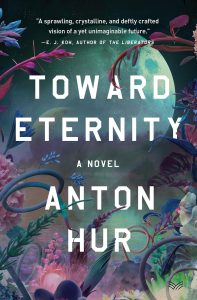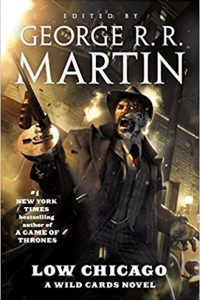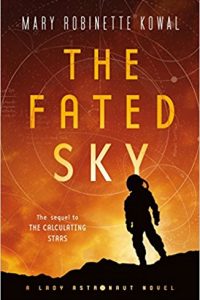Jake Casella Brookins Reviews Toward Eternity by Anton Hur
 Toward Eternity, Anton Hur (HarperVia 978-0-06334-448-8, 256pp, $26.99, hc) July 2024. Cover by Stephen Brayda.
Toward Eternity, Anton Hur (HarperVia 978-0-06334-448-8, 256pp, $26.99, hc) July 2024. Cover by Stephen Brayda.
Initially set in a near-future Cape Town, South Africa, and eventually taking us to ever more distant times and locales, Anton Hur’s debut novel Toward Eternity begins with scientist Mali Beeko confronting the mysterious disappearance and reapparance of “Patient One.” Mali specializes in a nanotechnology treatment that cures cancer by replacing the host’s cells with artificial, cancer-free versions; Patient One’s rapture and return are clear evidence that the process is evolving beyond its original parameters. Each subsequent chapter explores further developments in this “nanodroid” future, with identities merging and diverging over vast stretches of time, apocalyptic wars between humans and their replacements, and with both grief and immortality as recurring themes.
Hur anchors the time- and perspective-hopping story with an epistolary framework: a notebook, originally kept by Mali as a way to avoid digital scrutiny, and then passed on to others throughout the novel. I’m easily distracted by the condition of narration – how are we, the readers, getting access to these first person voices? – and found the notebook mechanism extremely effective for carrying me through the novel’s rotating narrators and tumultuous future histories. It’s also a wonderful and subtle way to show off diverse viewpoints: many of Toward Eternity’s speakers are isolated, in strange situations, and using the notebook mechanism allows Hur to give us an eclectic set of internal perspectives on the book’s premises, leaving it up to the reader to deduce much about the characters that might otherwise have been communicated with external descriptions.
And it’s a fascinating set of characters, with very different approaches to writing and thinking about their situations. Mali writes “I hate writing, and I hate language even more,” while Yonghun Han – our “Patient One” – is a literary scholar whose research involved creating artificial intelligence with a linguistic and semantic focus (echoes, here, of Richard Powers’s Galatea 2.2). That AI, Panit, becomes one our narrators, and is eventually given human form through the nanotechnology process – there’s a really lovely chapter with Panit reflecting on embodied cognition, what it means to feel poetry through the body. Finally, in the distant and often violent future, we get a range of related nano-created characters, many of them descended from Patient Two (Ellen, a concert cellist).
On the surface, the novel seems curiously uninterested in the hard problems of consciousness and identity – whether or not someone remains “the same person” when every cell is replaced by a machine, for instance, does not seem to be an immediate question for Mali and other early characters, and Panit’s consciousness is taken as a given. (By contrast, while reading this, I was thinking a lot about Greg Egan’s posthumanist work, such as “Learning to Be Me”, which overtly examines these issues.) But, of course, that’s only because the characters of Toward Eternity have more pressing concerns; the novel itself is deeply interested in philosophical questions, keeping them at a slight remove with its first-person narrators. One of its more haunting themes is the idea of the “redundant-self” which reemerges even in the supposedly perfect nanodroid bodies, scars and all, and the destructive futility of trying to prevent or perfect this return of the repressed. Another is identity in the context of loss and persistence: quasi-immortality as an insufficient remedy for grief, and the complexities of separation from parents, lovers, and children in a world where consciousness itself is so technologically mediated.
Hur is more likely known to SF readers in his capacity as a translator, including his superb work on Bora Chung’s collections, which I highly recommend; it’s no surprise, then, that Toward Eternity displays a deep and subtle care for language. There’s an intentional and even deceptive kind of minimalism here – the far future scenes have a descriptive thinness that can feel abstract for long stretches, only for a new narrator to open brief windows on vast scenes of complexity. It’s not a lack of substance, but a centering in particular viewpoints and voices, many of whom are trying to drill down to fundamentals in a chaotic world. (“Every time I remodel,” one character says early in the novel, “I find myself stripping things away.”) And it makes for an interesting contrast with other science fiction that has engaged with the same subjects in a more maximalist mode – I mentioned Egan, and was also reminded of Charles Stross’s Accelerando and Cory Doctorow’s Walkaway. Although profoundly different in style, Toward Eternity makes an interesting companion to Ben Berman Ghan’s The Years Shall Run Like Rabbits, another recent speculative and poetic work on identity, AI, and far-future visions.
Poetry is a major throughline in the novel, with work by Emily Dickinson, T.S. Eliot, and others providing motifs and themes – the novel’s title comes from the final line of Dickinson’s “Because I could not stop for Death.” Death and what comes after are deeply central concerns, in ways I don’t often see in science fiction swinging this big. At the end of the novel, I found myself most haunted by the question of what the nanites are up to, what they represent – behind the turbulent human and humanoid drama, they seem to stand for some larger force, some kind of telos, whether divine or world-historical I can’t say. While its details are character-driven and specific, with a vivid sense of loss, Toward Eternity has an insistence on persistence that’s intensely human even when its characters have moved beyond that category.
Jake Casella Brookins is from the Pennsylvania Appalachians, and spent a fantastic amount of time in the woods. He studied biology, before switching over to philosophy & literature, at Mansfield University. He’s been a specialty coffee professional since 2006. He’s worn a lot of coffee hats. He worked in Upstate New York and Ontario for about 8 years. He’s been in Chicago since 2013; prior to the pandemic, he worked for Intelligentsia Coffee in the Loop. Starting in 2021, he’s been selling books at a local indie bookstore. He lives with his wife, Alison, and their dogs Tiptree & Jo, in Logan Square.
This review and more like it in the July 2024 issue of Locus.
 While you are here, please take a moment to support Locus with a one-time or recurring donation. We rely on reader donations to keep the magazine and site going, and would like to keep the site paywall free, but WE NEED YOUR FINANCIAL SUPPORT to continue quality coverage of the science fiction and fantasy field.
While you are here, please take a moment to support Locus with a one-time or recurring donation. We rely on reader donations to keep the magazine and site going, and would like to keep the site paywall free, but WE NEED YOUR FINANCIAL SUPPORT to continue quality coverage of the science fiction and fantasy field.
©Locus Magazine. Copyrighted material may not be republished without permission of LSFF.





